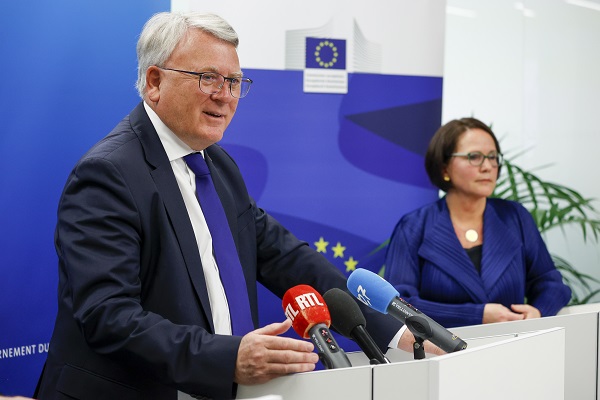 (L-R) Nicolas Schmit, European Commissioner for Employment and Social Rights; Yuriko Backes, Luxembourg’s Minister of Finance;
Credit: SIP/Julien Warnand
(L-R) Nicolas Schmit, European Commissioner for Employment and Social Rights; Yuriko Backes, Luxembourg’s Minister of Finance;
Credit: SIP/Julien Warnand
On Monday 17 April 2023, on the occasion of the second anniversary of the entry into force of the Recovery and Resilience Facility (RRF) and to mark the European Year of Skills, the European Commissioner for Employment and Social Rights, Nicolas Schmit, Luxembourg’s Minister of Finance, Yuriko Backes, and the Minister of Labour, Employment and the Social and Solidarity Economy, Georges Engel, attended a presentation on of one of the key components of Luxembourg's Recovery and Resilience Plan, which tackles skills and labour shortages.
European Commissioner Schmit said: "Skills mean jobs - quality jobs. With the European Year of Skills, we can bridge the gap between labour market-oriented training and labour shortages. To ensure that the transition to a carbon-neutral economy is truly fair and inclusive, we need massive and immediate investments in citizens' skills. I am delighted that Luxembourg has chosen skills as a priority in its Recovery and Resilience Plan and that results are already visible today."
Supported by the RRF, Luxembourg has adopted several initiatives in recent years to promote vocational training for jobseekers and employees, meet the challenges of digitalisation and strengthen anticipation of skills needs, notably within the framework of the “Skillsdësch” and the “FutureSkills” initiative. Concerning the latter, the ADEM employment agency’s strategy for the coming years includes actions aimed at matching demand and supply of skills.
Minister Backes added: "I am pleased to see that the NextGenerationEU initiative is bearing fruit in Luxembourg. Indeed, the implementation of the Luxembourg Recovery and Resilience Plan continues to make significant progress in the interest of our citizens and businesses. By focusing on skills, our plan promotes the creation of quality jobs, helps develop the technologies and practices needed to succeed in the climate transition and strengthens our capacity to meet future challenges. Together we are building a more sustainable, more solidarity-based and more competitive European Union."
Minister Engel remarked: "In these difficult times, the European Union needs to send strong signals. More than ever, we need to show citizens that the European Union is working for citizens and investing in citizens' future. As the minister in charge of employment, I welcome the highlighting of skills. It is essential to invest in acquiring new skills to ensure long-term employment."
2023 marks the second anniversary of the entry into force of the RRF. In its two years of existence, the RRF has reportedly been the origin of transformative reforms and investments throughout the member states, by advancing the ecological and digital transitions and increasing the overall resilience of the EU. To date, the European Commission has disbursed a total of more than €150 billion to the member states.
€83 million in RRF grants are currently allocated to the Luxembourg plan. The next step is to expand the plan through energy transition measures, using REPowerEU grants. According to the Finance Ministry, the Labour Ministry and the Representation of the European Commission in Luxembourg, the implementation of the Luxembourg Recovery and Resilience Plan is progressing well and has been meeting the challenges of the Grand Duchy’s economy and society. Considering that the first set of measures has been finalised and 26 milestones and targets have been achieved, Luxembourg has submitted the first payment request, for an amount of €25 million. The Commission was reported to be currently assessing the completion of the steps and target values.
The completed steps and targets cover reforms in the areas of green mobility, housing, digitalisation of the public sector and combating money laundering. For example, Luxembourg adopted its Housing Pact 2.0 with the aim of increasing the supply of affordable housing. Additionally, several investments have been made in the fields of skills, ultra-secure communication and digital health.
During the European Year of Skills, the Commission, the European Parliament, the member states, social partners, public and private employment services, chambers of commerce and industry, education and training providers, workers and businesses will work together to promote skills development to improve the professional and personal prospects of citizens.








